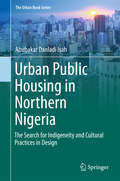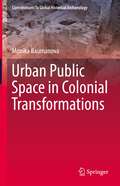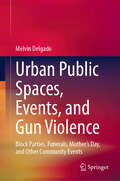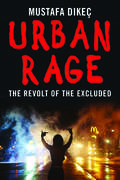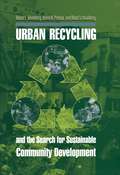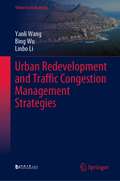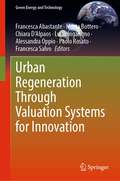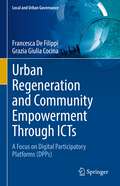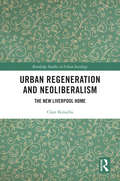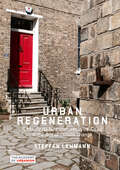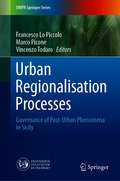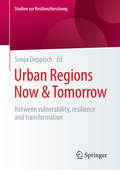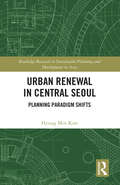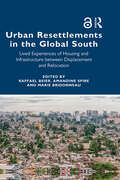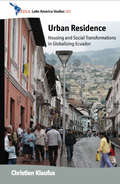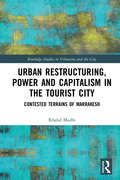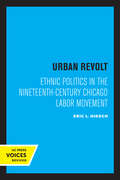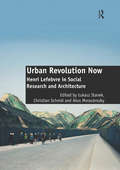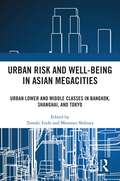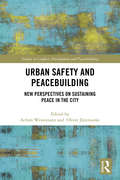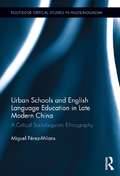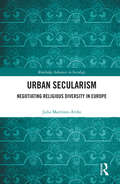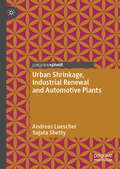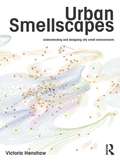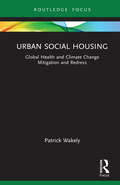- Table View
- List View
Urban Public Housing in Northern Nigeria
by Abubakar Danladi IsahThis book provides readers with two major practical insights. Firstly, on the basis of statistical inquiry it identifies the significance of socio-cultural elements that encourage user-instigated transformation. Secondly, it employs layout pattern analysis to distinguish transformation patterns, hence revealing an unbroken cultural link between residents and their roots. The book also sheds new light on the transformation of public housing in the context of culture-sensitive communities in Northern Nigeria. The research work is directed towards developing culture-responsive public housing design frameworks that are rooted in the current users' experiences. As a result, a broad portrait of prime design emerges from said experiences. In order to accomplish this goal, the study takes into account both phenomenological and interpretive dimensions. In the process, the cultural factors behind residents' transformations are uncovered.
Urban Public Space in Colonial Transformations (Contributions To Global Historical Archaeology)
by Monika BaumanovaThis book offers an interdisciplinary perspective on the precolonial to colonial transition in an urban context, by focusing on the changing distribution, character and role of public spaces and buildings. The volume focuses on three case study regions: East African coast, North-West Africa, and the Iberian Peninsula. The regions are selected to provide a novel perspective on the socio-spatial impact of colonialism on the public life of urban settlements, driven by different political forces, in different geographical contexts and time periods. The three study areas are also linked by sharing several features of urban lifestyle such as the role of trade and the influence of religion, Islam in particular. The intertwined influence of socio-spatial urban characteristics on public life is presented on a range of case studies selected from Africa and southern Europe. The approaches are rooted in archaeological thinking on the built environment as material culture and incorporate critical interpretation of ethnographies and historical accounts on both the precolonial and colonial eras. This volume is of interest to archaeologists and researchers working in urban history, anthropology, and heritage.
Urban Public Spaces, Events, and Gun Violence: Block Parties, Funerals, Mother's Day, and Other Community Events
by Melvin DelgadoThis book offers a new vision on urban gun violence that focuses on public space-centered concepts, events, and research. It builds on our existing knowledge base by viewing a "slice" of this problem through celebratory and solemn occasions and how violence at these events and spaces reflects on the state of urban gun violence. Understanding this context serves to inform us on how best to address this social phenomenon. Gun violence in the United States is a salient national problem with virtually no day that goes by without it occurring, particularly in urban public spaces, making it a significant social event. This book uniquely presents an urban- and event-focused context for gun violence. It also draws attention to marginalized urban communities, merging urban public spaces, events, intersectionality, social justice, and gun violence, introducing a unique window to better comprehend this violence as a national issue and bringing profound consequences when it transpires in a public event. To examine the context of public spaces and events in gun violence, the author organized the book’s ten chapters in three sections: Part I: Conceptual Foundation sets the foundation for a multifaceted perspective. Part II: Celebratory and Solemn Events expands the gun violence arena. Part III: Implications for Research, Education, and Practice. Urban Public Spaces, Events, and Gun Violence: Block Parties, Funerals, Mother’s Day, and Other Community Events expands the context of gun violence beyond the street scene to include public settings and events, and helps in achieving a comprehensive understanding of this public health problem and how best to solve it. The book is essential reading for practitioners, academics, and researchers in public health, social work, criminal justice, and community practice.
Urban Rage: The Revolt of the Excluded
by Mustafa DikecA timely and incisive examination of contemporary urban unrest that explains why riots will continue until citizens are equally treated and politically included In the past few decades, urban riots have erupted in democracies across the world. While high profile politicians often react by condemning protestors’ actions and passing crackdown measures, urban studies professor Mustafa Dikeç shows how these revolts are in fact rooted in exclusions and genuine grievances which our democracies are failing to address. In this eye-opening study, he argues that global revolts may be sparked by a particular police or government action but nonetheless are expressions of much longer and deep seated rage accumulated through hardship and injustices that have become routine. Increasingly recognized as an expert on urban unrest, Dikeç examines urban revolts in the United States, United Kingdom, France, Sweden, Greece, and Turkey and, in a sweeping and engaging account, makes it clear that change is only possible if we address the failures of democratic systems and rethink the established practices of policing and political decision-making.
Urban Recycling and the Search for Sustainable Community Development
by David N. Pellow Allan Schnaiberg Adam S. WeinbergMore Americans recycle than vote. And most do so to improve their communities and the environment. But do recycling programs advance social, economic, and environmental goals? To answer this, three sociologists with expertise in urban and environmental planning have conducted the first major study of urban recycling. They compare four types of programs in the Chicago metropolitan area: a community-based drop-off center, a municipal curbside program, a recycling industrial park, and a linkage program. Their conclusion, admirably elaborated, is that recycling can realize sustainable community development, but that current programs achieve few benefits for the communities in which they are located. The authors discover that the history of recycling mirrors many other urban reforms. What began in the 1960s as a sustainable community enterprise has become a commodity-based, profit-driven industry. Large private firms, using public dollars, have chased out smaller nonprofit and family-owned efforts. Perhaps most troubling is that this process was not born of economic necessity. Rather, as the authors show, socially oriented programs are actually more viable than profit-focused systems. This finding raises unsettling questions about the prospects for any sort of sustainable local development in the globalizing economy. Based on a decade of research, this is the first book to fully explore the range of impacts that recycling generates in our communities. It presents recycling as a tantalizing case study of the promises and pitfalls of community development. It also serves as a rich account of how the state and private interests linked to the global economy alter the terrain of local neighborhoods.
Urban Redevelopment and Traffic Congestion Management Strategies (Urban Sustainability)
by Bing Wu Yanli Wang Linbo LiThis book focuses on the relationship between urban land redevelopment and traffic systems and discusses the related research. Consisting of three main parts, the first analyzes the interaction between land redevelopment and traffic congestion as well as the mechanisms and causes of traffic congestion. The second part presents strategies for the prevention and control of traffic congestion under urban land redevelopment, proposing a two-stage evaluation system of traffic congestion pre-inspection and traffic impact analysis in the planning and implementation stages of land redevelopment. Lastly, the third section includes an application case analysis of the proposed traffic congestion management strategy.
Urban Regeneration Through Valuation Systems for Innovation (Green Energy and Technology)
by Marta Bottero Alessandra Oppio Francesca Abastante Paolo Rosato Chiara D’Alpaos Luisa Ingaramo Francesca SalvoThis book examines the role of the evaluation models in decision-making processes for the construction of circular cities in the digital revolution. In particular, the book explores the need for a rethinking of development models proposed by the circular economy which requires the valorization of natural, social and economic capital. Urban environment represents a crucial field of analysis in which applying the circular-economy principles in order to steer a course towards a sustainable economy characterized by processes meant to create value instead of extracting it, which put a step forward in the pathway towards a better future in terms of economic, environmental and social effects and desirable outcomes. In this context, the design of urban regeneration processes and housing environments requires the adoption of inclusive analysis/assessment models combined with the structuring and organization of public/private investments that can contribute to creating positive natural and social impacts as well as economic and financial returns. This fundamental paradigm shift is accentuated in the current context, in which the digital revolution is reinventing the future and calls for a rethinking and reformulation of value systems in the era of technological process innovations, while respecting economic, natural and social ecosystems.
Urban Regeneration and Community Empowerment Through ICTs: A Focus on Digital Participatory Platforms (DPPs) (Local and Urban Governance)
by Francesca De Filippi Grazia Giulia CocinaThis book deals with the issue of Digital Participatory Platforms (DPPs) for urban governance. It explains the role and potential that ICTs play in the decision-making processes of the Public Administration and citizens' participation. The book also illustrates the main technologies that encourage innovation and social inclusion, with particular focus on use of DPPs in urban regeneration programs and projects. It presents international best practices from local to European level and it describes the process of creation, development and testing of a DPP project with reference to the Italian case. The book is divided into three parts:the first one gives a framework of neighborhood urban and civic engagement through ICTs, studying in depth the role of ICTs in support of Public Administration’s processes and citizens participation;the second part investigates the topic of Digital Participatory Platforms (DPPs) with the description of their potentialities, the presentation of some international best practices and a specific focus on the Italian context;the third part draws the conclusions of this path by asking which are the main challenges in the adoption of Digital Participatory Platforms, in order to increase citizen participation and collaboration via technology.
Urban Regeneration and Neoliberalism: The New Liverpool Home (Routledge Studies in Urban Sociology)
by Clare KinsellaThis book explores the concept of ‘home’ in Liverpool over phases of ‘regeneration’ following the Second World War. Using qualitative research in the oral history tradition, it explores what the author conceptualises as ‘forward-facing’ regeneration in the period up to the 1980s, and neoliberal regeneration interventions that ‘prioritise the past’ from the 1980s to the present. The author examines how the shift towards city centre-focused redevelopment and ‘event-led’ initiatives has implications for the way residents make sense of their conceptualisations of ‘home’, and demonstrates how the shift in regeneration focus, discourse, and practice, away from Liverpool’s neighbourhood districts and towards the city centre, has produced changes in the ways that residents identify with neighbourhoods and the city centre, with prominence being given to the latter. Employing Pierre Bourdieu’s concepts of habitus and field as mechanisms for understanding different senses of home and shifts from localised views to globalised views, this book will appeal to those with interests in urban sociology, regeneration, geography, sociology, home cultures, and cities.
Urban Regeneration: A Manifesto for transforming UK Cities in the Age of Climate Change
by Steffen LehmannUrban Regeneration — A Manifesto for transforming UK Cities in the Age of Climate Change explores and offers guidance on the complex process of how to transform cities, continuing the unfinished project of the seminal 1999 text Towards an Urban Renaissance. It is a 21st-century manifesto of urban principles compiled by a prominent urbanist, for the regeneration of UK cities, focusing on the characteristics of a ‘good place’ and the strategies of sustainable urbanism. It asks readers to consider how we can best transform the derelict, abandoned and run-down parts of cities back into places where people want to live, work and play.The book frames an architecture of re-use that translates and combines the complex ‘science of cities’ and the art of urban and architectural design into actionable and practical guidance on how to regenerate cities. Fascinated by the typology and value of the compact UK and European city model, Lehmann introduces the concept of ‘high density without high buildings’ as a solution that will make our cities compact, walkable, mixed-use and vibrant again.
Urban Regionalisation Processes: Governance of Post-Urban Phenomena in Sicily (UNIPA Springer Series)
by Marco Picone Vincenzo Todaro Francesco Lo PiccoloThis book explores the issues of transformation phenomena of the urban dimension (regionalization processes) that traditional scientific literature fails to describe appropriately. So far, scholars have adopted a widespread dominant perspective that proved unable to grasp the essence of post-modern complexities that urban spaces imply. The book provides a taxonomy, in order to describe the rules of these new and peculiar cities, by using the living dimension as a device for the epistemological breaking down of traditional socio-spatial analyses. After a thorough theoretical introduction, it describes two Sicilian case studies that prove particularly relevant to the construction of a new, alternative urban regionalization theory. These two areas, Palermo and South-Eastern Sicily, are described through several aspects, such as the role of migrants and migrations in defining urban regionalization, the power of fiction and the new urban forms that are slowly emerging in Sicily. Overall, this book provides a refreshing view of what Sicily has been and is becoming, by deconstructing most of its clichés and suggesting theoretical perspectives grounded in both quantitative and qualitative analyses.
Urban Regions Now & Tomorrow
by Sonja DeppischThis book points to three dominant concepts of how to deal with long-term or surprising and also sudden catastrophic changes, with a main focus on resilience. It is dealing with past, current and future change processes in European, Northern American as well as Australian cities and urban regions, and with the challenges they pose to a resilient urban development. Additionally, contributions deal with potential transformations of urban and regional development and related planning and governance approaches.
Urban Renewal in Central Seoul: Planning Paradigm Shifts (Routledge Research in Sustainable Planning and Development in Asia)
by Hyung Min KimKim details a brief history of urban renewal in central Seoul through articulating urban planning paradigm shifts. This book illustrates four main themes in central Seoul: the restoration of the Cheonggye stream, the redevelopment of the Sewoon Plaza, the enhancement of walkability and public transport networks, and history- centred urban renewal.Urban renewal is seen as a remedy for urban sprawl and is appreciated for its capacity to make use of pre-existing infrastructure and cultural assets in high- density urban areas. However, it faces critical challenges, such as fragmented property ownership and escalated land prices in comparison with peri- urban areas. The book focuses on how planning policies have shaped the urban renewal process in central Seoul, South Korea. Spatial development policies for central Seoul have been changed from modern transport facilities, post- war reconstruction, informality, industrialisation to walkability, sustainability, and social cohesion in line with economic restructuring. In recent times, there has been a significant change in thinking towards creating public spaces for walking, preserving historical sites and heritage, and maintaining green spaces. These interconnected topics contribute to understanding the complexity of urban renewal.This book is a useful read for researchers on urban planning and policies who are keen to understand the complicated process of urban renewal and ways to revitalise economic and human activities and transform built environments.
Urban Resettlements in the Global South: Lived Experiences of Housing and Infrastructure between Displacement and Relocation
by Raffael BeierUrban Resettlements in the Global South provides new perspectives on resettlement through an urban studies lens. To date, resettlement has been theorised through development studies and refugee studies, but urban resettlement is also a major dimension of urban development in the Global South and may help to rethink contemporary urban dynamics between spectacular new town developments and rising incidences of eviction and displacement. Conceptualising resettlement as a binding notion between production/regeneration and destruction/demolition of urban space helps to illuminate interdependencies and to underline significant ambiguities within affected people’s perspectives towards resettlement projects. This volume will offer an interesting selection of ten different case studies with rich empirical data from Latin America, North and Sub-Saharan Africa, and Asia, focused on each stage of resettlement (before, during, after relocation) through different timescales. By offering a frame for analysing and rethinking resettlement within urban studies, it will support any scholar or expert dealing with resettlement, displacement, and housing in an urban context, seeking to improve housing and planning policies in and for the city.
Urban Residence
by Christien KlaufusRiobamba and Cuenca, two intermediate cities in Ecuador, have become part of global networks through transnational migration, incoming remittances, tourism, and global economic connections. Their landscape is changing in several significant ways, a reflection of the social and urban transformations occurring in contemporary Ecuadorian society. Exploring the discourses and actions of two contrasting population groups, rarely studied in tandem, within these cities--popular-settlement residents and professionals in the planning and construction sector--this study analyzes how each is involved in house designs and neighborhood consolidation. Ideas, ambitions, and power relations come into play at every stage of the production and use of urban space, and as a result individual decisions about both house designs and the urban layout influence the development of the urban fabric. Knowledge about intermediate cities is crucial in order to understand current trends in the predominantly urban societies of Latin America, and this study is an example of needed interdisciplinary scholarship that contributes to the fields of urban studies, urban anthropology, sociology, and architecture.
Urban Restructuring, Power and Capitalism in the Tourist City: Contested Terrains of Marrakesh (Routledge Studies in Urbanism and the City)
by Khalid MadhiThe book focuses on the processes of urban restructuring, power relations and the political economy of touristic authenticity. Through an in-depth analysis of Marrakesh, Morroco, the book proposes a comprehensive analytic framework. It highlights the issues of (post)coloniality, ideology, heritage-commodification, subjectivity and counter-conduct in the shadow of global capitalism. It explores how power relations and political ecomomy have shaped the city of Marrakesh over the past few decades, formulating new subjectivities. It reveals how urban policy’s sole purpose is to boost tourism in the city, bringing into question the long-term resilience and success of tourism as an economic activity and a policy choice. This book considers how the well-being of city residents is submitted to such policies, conforming to certain forms of appropriation – of land, culture and memory. The example of Morocco helps us understand a phenomenon affecting many other cities internationally. This book will be valuable to academics and practitioners across disciplines, including geography, political science, urban planning and architecture.
Urban Revolt: Ethnic Politics in the Nineteenth-Century Chicago Labor Movement
by Eric L. HirschUrban Revolt is an incisive reexamination of the most highly mobilized urban revolutionary force in American history—the late nineteenth-century Chicago labor movement. By documenting the importance of ethnic origins in accounting for political choice, Eric L. Hirsch completely reconceptualizes the dynamics of urban social movements. Hirsch links the industrialization of Chicago to the development and maintenance of an ethnically segmented labor market. Urbanization, he argues, fostered ethnic enclaves whose inhabitants were channeled into particular kinds of jobs and excluded from others. Hirsch then demonstrates the political implications of emergent ethnic identities and communities. In the late nineteenth century, Chicagoans of German background—denied economic power by Anglo-Americans' control of craft unions and excluded from political influence by Irish-dominated political machines—formulated radical critiques of the status quo and devised innovative political strategies. In contrast, the Irish revolutionary movement in Chicago targeted the oppressive British political system; Irish activists saw no reason to overthrow a Chicago polity that brought them political and economic upward mobility. Urban Revolt gives a new perspective on revolutionary mobilization by de-emphasizing the importance of class consciousness, social disorganization, and bureaucracy. In his original and provocative focus on the importance of ethnicity in accounting for political choice, Hirsch makes a valuable contribution to the study of social movements, race, and working-class politics. This title is part of UC Press's Voices Revived program, which commemorates University of California Press’s mission to seek out and cultivate the brightest minds and give them voice, reach, and impact. Drawing on a backlist dating to 1893, Voices Revived makes high-quality, peer-reviewed scholarship accessible once again using print-on-demand technology. This title was originally published in 1990.
Urban Revolution Now: Henri Lefebvre in Social Research and Architecture
by Christian SchmidWhen Henri Lefebvre published The Urban Revolution in 1970, he sketched a research itinerary on the emerging tendency towards planetary urbanization. Today, when this tendency has become reality, Lefebvre’s ideas on everyday life, production of space, rhythmanalysis and the right to the city are indispensable for the understanding of urbanization processes at every scale of social practice. This volume is the first to develop Lefebvre’s concepts in social research and architecture by focusing on urban conjunctures in Barcelona, Belgrade, Berlin, Budapest, Copenhagen, Dhaka, Hong Kong, London, New Orleans, Nowa Huta, Paris, Toronto, São Paulo, Sarajevo, as well as in Mexico and Switzerland. With contributions by historians and theorists of architecture and urbanism, geographers, sociologists, political and cultural scientists, Urban Revolution Now reveals the multiplicity of processes of urbanization and the variety of their patterns and actors around the globe.
Urban Risk and Well-being in Asian Mega Cities: Urban Lower and Middle Classes in Bangkok, Shanghai, and Tokyo
by Tamaki EndoRapid urbanisation presents challenges such as inequality, informalisation and diversified, social needs for emerging cities. Informal and formal institutions and their impact on urban development and wellbeing vary across social classes and cities. Endo, Shibuya, and their contributors provide a systematic and multifaceted overview of urban wellbeing. It explores the characteristics and complexities of urban wellbeing of lower and middle classes in Asian megacities. The book explains that social setting and socioeconomic condition of individuals and households play critical role in urban wellbeing. It offers insights on the vulnerabilities and resilience of urban populations and the intertwined dynamics of social networks and what they mean for individual wellbeing. A useful reference for students, researchers and academics in urban studies, Asian studies or development studies.
Urban Safety and Peacebuilding: New Perspectives on Sustaining Peace in the City (Studies in Conflict, Development and Peacebuilding)
by Oliver Jütersonke Achim WennmannThis volume draws together original research related to conceptual and practical advances at the interface of urban safety and peacebuilding. The book reflects the advances in urban safety and peacebuilding to help address the rapidly increasing risk of conflict and insecurity in cities. Specifically, it draws on contributions to the Technical Working Group on the Confluence of Urban Safety and Peacebuilding Practice, an informal expert network co-facilitated by the United Nations Office at Geneva, UN-Habitat’s Safer Cities Programme, and the Geneva Peacebuilding Platform. A focus on ‘sustaining peace’ serves as a framework for situating new policy responses against conflict, violence, and exclusion in the city, and for promoting a conversation across disciplinary and specialist silos. The volume thereby broadens the optic of peacebuilding practice beyond interstate and intrastate armed conflicts – and especially their aftermath – and reconnects it to the community-level origins of building peace. The analysis and practice presented here will remind those willing to work towards peaceful and inclusive cities that there are tried and tested approaches available, and a host of experts and practitioners ready to accompany those prepared to lead in their respective contexts. This book will be of interest to students and researchers in the fields of peacebuilding, urban studies, security studies, and international relations.
Urban Schools and English Language Education in Late Modern China: A Critical Sociolinguistic Ethnography (Routledge Critical Studies in Multilingualism)
by Miguel Perez-MilansShortlisted for the 2014 BAAL Book Prize This book explores the meaning of modernization in contemporary Chinese education. It examines the implications of the implementation of reforms in English language education for experimental-urban schools in the People’s Republic of China. Pérez-Milans sheds light on how national, linguistic, and cultural ideologies linked to modernization are being institutionally (re)produced, legitimated, and inter-personally negotiated through everyday practice in the current context of Chinese educational reforms. He places special emphasis on those reforms regarding English language education, with respect to the economic processes of globalization that are shaping (and being shaped by) the contemporary Chinese nation-state. In particular, the book analyzes the processes of institutional categorization of the "good experimental school", the "good student", and the "appropriate knowledge" that emerge from the daily discursive organization of those schools, with special attention to the related contradictions, uncertainties and dilemmas. Thus, it provides an account of the on-going cultural processes of change faced by contemporary Chinese educational institutions under conditions of late modernity. Winner of The University of Hong Kong's Faculty Early Career Research Output Award for outstanding book publication, by the Faculty of Education
Urban Secularism: Negotiating Religious Diversity in Europe (Routledge Advances in Sociology)
by Julia Martínez-AriñoWhile French laïcité is often considered something fixed, its daily deployment is rather messy. What might we learn if we study the governance of religion from a dynamic bottom-up perspective? Using an ethnographic approach, this book examines everyday secularism in the making. How do city actors understand, frame and govern religious diversity? Which local factors play a role in those processes? In Urban Secularism: Negotiating Religious Diversity in Europe, Julia Martínez-Ariño brings the reader closer to the entrails of laïcité. She provides detailed accounts of the ways religious groups, city officials, municipal employees, secularist actors and other civil-society organisations negotiate concrete public expressions of religion.Drawing on rich empirical material, the book demonstrates that urban actors draw and (re-)produce dichotomies of inclusion and exclusion, and challenge static conceptions of laïcité and the nation. Illustrating how urban, national and international contexts interact with one another, the book provides researchers with a deeper understanding of the multilevel governance of religious diversity.
Urban Shrinkage, Industrial Renewal and Automotive Plants
by Andreas Luescher Sujata ShettyThis book focuses on the relationship between the auto industry and the built environment at multiple scales, a topic of particular interest now as the industry is going through a period of major transformation. Drawing from multiple perspectives, including architecture, urban design and urban planning, the authors examine the changing form of the auto factory itself, the changing geography of auto production, and the challenges faced by communities as the auto plants that once brought them prosperity, and often a sense of identity, leave town. They examine four places that are dealing in different ways, and with varying success, with the aftermath of a decommissioned auto plant in their midst. These are Janesville, Wisconsin, and Willow Run, Michigan, in the U.S., and Bochum, Germany, and Genk, Belgium, in Europe. Together these four cases provide some clues about what the future might look like for places that were once intimately connected with the manufacture of cars.
Urban Smellscapes: Understanding and Designing City Smell Environments
by Victoria HenshawWe see the city, we hear the city, but above all: we smell the city. Scent has unique qualities: ubiquity, persistence, and an unparalleled connection to memory, yet it has gone overlooked in discussions of sensory design. What scents shape the city? How does scent contribute to placemaking? How do we design smell environments in the city? Urban Smellscapes makes a notable contribution towards the growing body of literature on the senses and design by providing some answers to these questions and contributing towards the wider research agenda regarding how people sensually experience urban environments. It is the first of its kind in examining the role of smell specifically in contemporary experiences and perceptions of English towns and cities, highlighting the perception of urban smellscapes as inter-related with place perception, and describing odour’s contribution towards overall sense of place. With case studies from factories, breweries, urban parks, and experimental smell environments in Manchester and Grasse, Urban Smellscapes identifies processes by which urban smell environments are managed and controlled, and gives designers and city managers tools to actively use smell in their work.
Urban Social Housing: Global Health and Climate Change Mitigation and Redress
by Patrick WakelyThis book proposes operational approaches to public sector support to community-led development of urban low-income group social housing in the prevailing and medium-term. Within the context of mitigating and redressing the existential threats of climate change and global pathogenic transmission, building on current concerns of global heating and the lessons learnt from the 2020-22 COVID-19 pandemic, the book closely examines recent examples from a wide international range of countries and cities from the Sri Lanka experience to Arab States of the Middle East and the Andes. Topics include maintenance and management of public sector housing, poverty alleviation objectives, climate change mitigation, housing density, local land management and planning, land rights, affordable housing markets, and international governance and administration, ultimately pointing to the universal need for institutional, organisational and human skills development and the compilation and dissemination of operationally successful examples of participatory partnerships for affordable social housing. The book will be of interest to researchers, instructors, practitioners, and students of urban development, housing, environmental design, land-use planning, public administration and environmental health engineering.
